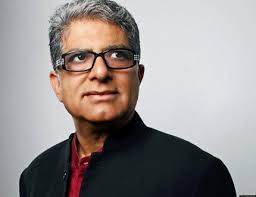Poem 24
He who stands on tiptoe
doesn't stand firm.
He who rushes ahead
doesn't go far.
He who tries to shine
dims his own light.
He who defines himself
can't know who he really is.
He who has power over others
can't empower himself.
He who clings to his work
will create nothing that endures.
If you want to accord with the Tao,
just do your job, then let go.
Commentary
Deepak Chopra: Author, Spiritual Guide, Medical Doctor
Wisdom is bought at a high price - the price of experience. We all essentially learn the hard way. How often have we heard our elders say that they went to the "school of hard knocks!" One of my special needs students said the following the other day: "Life does not get any easier; you just have to learn to laugh harder!" Pure wisdom, that! The poetry, whether of the Psalms in the Old Testament or the poems in the Tao Te Ching, attempts to capture some wisdom by sheer dint of paradox or seeming contradiction; by setting up polar opposites; by stretching language to its breaking point.
Sometimes when we try too hard we don't achieve the results we want at all. It's as if the ego gets in its own way and trips itself up. The ego stretches itself up on tippy toes in a vain effort to see what's going on. However, on a physical level, as we know, we are only able to maintain our bodies on tippy toes - in such a stretched mode - for literally several moments as we strain say to look over a high fence. On tippy toes we simply cannot stand firm. Anyone who runs or jogs will know that such exercise needs to be paced properly. If the runner or jogger sets out on their chosen route at far too quick a pace. he will not be able to complete it in the proper time or indeed in the proper state of well-being. Hence, the lapidary piece of wisdom in the above poem: "He who rushes ahead doesn't go far!" I remember an old teacher I had at school used often say: "The longest way round is often the shortest way home!" Why? Well, the longest way round might not have as many obstacles as the shortest way!!
Clinical psychologist, Psychotherapist Dr Carl Rogers
I simply love the line: "He who tries to shine dims his own light." Again, it appears to this reader and meditator that this is all about our ego getting in the way of the wisdom that naturally lives in our True Self (Deepak Chopra) or Real Self (Carl Ransom Rogers), in our Soul (religion/spirituality) or in our Heart of Hearts (traditional phrase meaning inner and true feelings). It is so obvious when people are boasting of their abilities or attempting to get "one up" on us (one upmanship) or pretending to be something they are not. Likewise, any person who thinks he can define himself clinically or precisely is simply deluded. Just as the author puts it, this person "cannot know who he really is." There is a mystery that lies at the heart of us all and we only gradually get to know that mystery. Indeed, I believe we cannot really comprehend, apprehend or grasp that mystery in its entirety or fullness. However, we do get glimpses of our True Self.
Then we come to one of the most corrupt impulses of the ego, namely the drive for power. Persons who do not know themselves properly, or who have failed, as Carl Jung puts it, to properly integrate their shadow nature, all project their worst fears and hatreds onto others. Hence we get breakdowns in the various relationships between husbands and wives, managers and staff, leaders and teams and indeed between different states. When people exercise power over others in this egoic way they actually have failed to empower themselves to simply be their truest selves. Likewise, if we cling to our work in an effort to gain some identity, we set up a state of dependence on our workaday activity to give us a sense of our true self and such a state of dependence only leads to a false sense of self!
Letting go is the answer, and indeed it is the answer given by all religious and spiritual traditions. What are we asked to let go of? We are asked to let go of our Ego, of our desires to cling to sensual pleasures, to cling to others, to cling to ideas, to cling to our partners, to cling to our jobs, to cling to our pride, to cling to all false ideas of who we are. We are asked, in short, to let go of the False Self and embrace our True Self. This is not easily done, but by constant practice of meditation and other spiritual acts like writing, composing poems or music, sculpting, pottery making and so on and so forth, we gradually chip away at our masks and bit by bit expose our True Self to the light of our consciousness. Indeed, none of us ever gets there. Rather like the asymptote we only get there way out at infinity.
Conclusion:
Once again, perhaps some word, phrase or clause in above poem strikes a chord with you. If so why not use it as a mantra for a short meditative practice for five or ten minutes. Namaste, my friends.



No comments:
Post a Comment